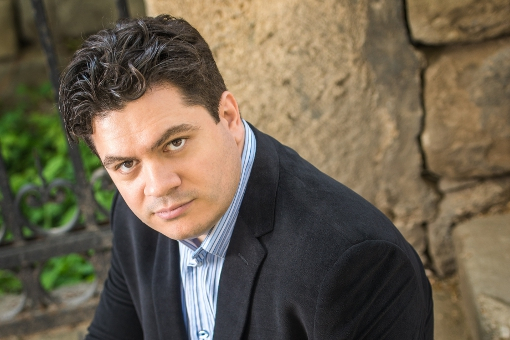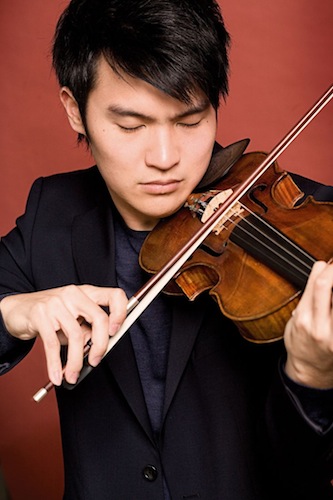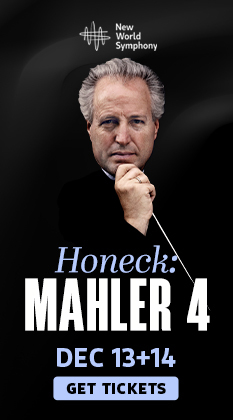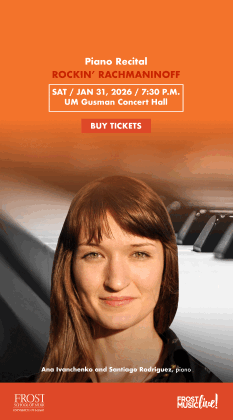Danish National Symphony delivers powerful Nielsen at Arsht

Cristian Macelaru conducted the Danish National Symphony Orchestra Saturday night at the Arsht Center. Photo: Sorin Popa
From the world of the Baltic Sea and long winter nights, the Danish National Symphony Orchestra brought to Miami an all-Nordic program Saturday night.
The orchestra gave a magnificent performance at the Arsht Center of a symphony by Carl Nielsen, generally considered their country’s greatest composer, as well as two works by his Finnish contemporary, Jean Sibelius. Leading the orchestra was guest conductor Cristian Măcelaru, a violin graduate of the University of Miami’s Frost School of Music, former concertmaster of the Miami Symphony and now conductor-in-residence of the Philadelphia Orchestra.
The phrase “fire and ice” is sometimes used to describe Sibelius’ Violin Concerto, and in violinist Ray Chen’s performance, you mostly heard the fire. Chen has a blazing technique on the instrument. Even if you watched him play without hearing a sound, from the high angle at which he held the violin, the vigorous arm strokes and the bow flourishes with which he ended dramatic passages, you could tell this was a virtuoso in the heroic mode.
In the opening movement, he brought a huge tone and a thumping aggressiveness to fast pages on the instrument’s lowest string. He played passages in broken octaves with a piercing intensity, easily holding his own against the massed forces of the orchestra. And he put across a rich, passionate tone in the high melody in double stops, where the violinist plays two notes at once.
There was a uniform intensity to his performance, however, that allowed little of the lonely, wintry spirit of the work to be heard. Soft phrases, like the quiet ascending melody that leads to a passage in broken octaves, came off with the same fast vibrato and urgency that he brought to the rest of the piece.
But there was much to admire about his performance. In the smoothly played melody of the Adagio, he brought organ-like tones to the climactic phrases in double stops, being heard easily above the orchestra even though the conductor didn’t seem to be holding back much. Chen delivered a bravura performance of the difficult, fiery last movement—easily handling the double stops with staccato bowing and artificial harmonics—glassy, difficult-to-play notes that he produced to ghostly effect, giving a rousing performance. The orchestra provided fine support, with craggy lower winds and dark, turbulent strings that give the work so much of its unique tone.
As an encore, Chen played Paganini’s Caprice No. 21, rendered with a luscious tone in a long melody in double stops, followed by staccato passages of hair-raising speed and precision.
The concert opened with Sibelius’ popular Valse Triste, in a performance that wasn’t very waltz-like but did display the warm sonority of the orchestra’s strings.
After intermission, Măcelaru walked on stage, stepped up to the podium and, without waiting for the applause to die down, signaled the violent notes that open Nielsen’s Symphony No. 4. Known as “The Inextinguishable,” this is the composer’s most popular symphony, and the orchestra’s mastery of it was apparent throughout.
Măcelaru’s abrupt opening prefaced a fast, headlong account, with an edgy, downhill style that gave the performance a spontaneous feeling. The brass gave a heroic performance, and if they occasionally overpowered the rest of the orchestra in a manner that might make some quibble about balances, that’s sometimes what they’re supposed to do, especially in a work that often feels like a symphonic civil war.
Winds offered distinction in the pastoral melodic passages that appear amid all the orchestral strife, with evocative solos in flute, oboe and other instruments. Violins gave a hyper-articulated, precise and fiery account of fast passages in the last movement. In the last movement’s soaring melodies, with the entire ensemble playing at full volume, it would be hard to beat the performance for sheer magnificence of orchestral sound.
The orchestra responded to the applause and standing ovation with a smooth and vigorous encore of the Overture to Nielsen’s opera Maskarade.
The Danish National Symphony Orchestra will repeat the program 8 p.m. Sunday at the Kravis Center for the Performing Arts in West Palm Beach. kravis.org; 561-832-7469.
Posted in Performances
Leave a Comment
Sun Feb 15, 2015
at 12:51 pm
No Comments







